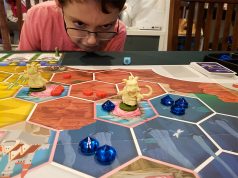
I recently watched a series of videos on YouTube from a professor’s class on game design. One of the core curricula of the course was for students to play a game several times then write a paper dissecting the game’s core elements. I found this quite fascinating.
For anyone new to gaming, is interested in designing games, or who just wants to feel like they have a broad experience of game design paradigms and mechanisms, this article series is for you.
 Merriam Webster currently defines a “canon” as “a sanctioned or accepted group or body of related works”. The games selected for this series represent the pinnacle of game form or are widely accepted paradigms of game design. They’re not always the highest rated games, but they drive an audience time and again. The mechanisms they employ are representative of the gaming industry as a whole.
Merriam Webster currently defines a “canon” as “a sanctioned or accepted group or body of related works”. The games selected for this series represent the pinnacle of game form or are widely accepted paradigms of game design. They’re not always the highest rated games, but they drive an audience time and again. The mechanisms they employ are representative of the gaming industry as a whole.
The first game in this article series is Dungeons & Dragons (currently 5th Edition, aka D&D, reviewed here).
No understanding of the gaming landscape is complete without an understanding of what D&D is, how it works, and why people regard it as fun. Roleplaying games dominate a section of the tabletop gaming hobby and D&D still essentially functions as it did thirty years ago. If you can’t find a playgroup to try it out, check out this video and this one.




















Could you add links to the videos that you mention at the start of this?
https://www.youtube.com/watch?v=jT3FRzEJDp8
and
https://www.youtube.com/watch?v=yLEMb_RIZ3o
https://www.youtube.com/watch?v=9EbXhdCk78s